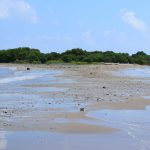Category:Press

A press conference on ‘highlighting the need to ensure water, food and habitat security for all’ was held on the 31st of January 2017 organised by EFL together with the Federation of Environmental Organizations (FEO). The panel of speakers comprised Dr. Sumith Pilapitaya (FEO), Mr. Rukshan Jayawardene (WNPS), Mr. Sajeewa Chamikara (ECT), Dr. Sevvandi Jayakody (EFL), each focusing on critical issues relating to deforestation in Sri Lanka.
As the first speaker, Mr. Sajeewa Chamikara addressed the negative social, economic and ecological impacts of deforestation. One main problem highlighted was the lack of access to drinking water, creating human health issues. He explained how the dry zones in the country has begun to experience irregular patterns of rain due to deforestation and how it affects agricultural farming as well. Emphasis was also made on the significance of blocking or deforesting elephant corridors and its contribution to the acceleration of the human elephant conflict. Mr. Sajeewa equally addressed other primary causes of deforestation such as the clearing of forests for development and cultivation and irresponsible measures taken by the tourism industry.
The next speaker, Mr. Rukshan Jayawardena from WNPS, who is also a director of EFL, focused on the reliability and accuracy of statistics provided by the Forest Department of Sri Lanka or the lack thereof and the discrepancies in figures issued by related government departments on forest cover in Sri Lanka. He stressed the importance of conducting accurate research, especially field research to overcome this problem and urged the media to put pressure on relevant authorities to be more accountable of their published data. As per Mr. Jayawardena, misinformation is misleading, which makes it difficult to identify the severity of the problem.

Another speaker, Dr. Sumith Pilapitiya, highlighted the prime causes of deforestation in Sri Lanka and pointed out the insufficiency in long term or sustainable planning of the government as the main contributor. He went on to criticise the government and businesses for not considering the negative impact on the environment when planning and making decisions. Moreover, Dr. Pilapitiya stressed the need for proper coordination between relevant government authorities and stricter law enforcement.
Lastly Dr. Sevvandi Jayakody, another EFL director discussed the direct benefits of reforestation, demonstrating extensively on its ecosystem services. Information was provided on past and present forest cover in Sri Lanka using graphs and imagery. She was another speaker who expressed disappointment in the inefficiencies of the Forest Department of Sri Lanka by sharing a personal experience and the difficulties and limitations her team had to face to publish and use the valuable findings of a report on National Conservation (NCR). To her knowledge, this report is yet to be utilised which further exemplifies the inaction from government authorities.
The conference ended with an open forum for questions and answers. A member of the press, Ms. Kumudini Hettiarachchi, raised a question on the way forward for Sri Lanka. The panel presented suggestions such as looking at deforestation as a long term problem to find long term solutions, empowering and informing the public through media in order to take a strong stance against these issues and ensuring accuracy on statistical figures and research conducted.





